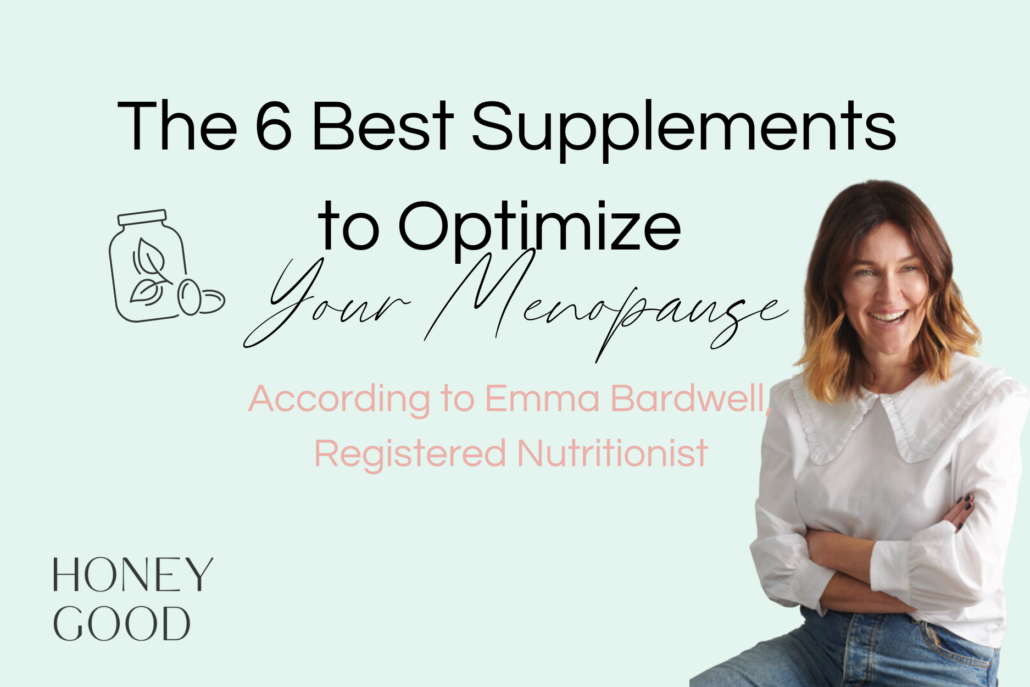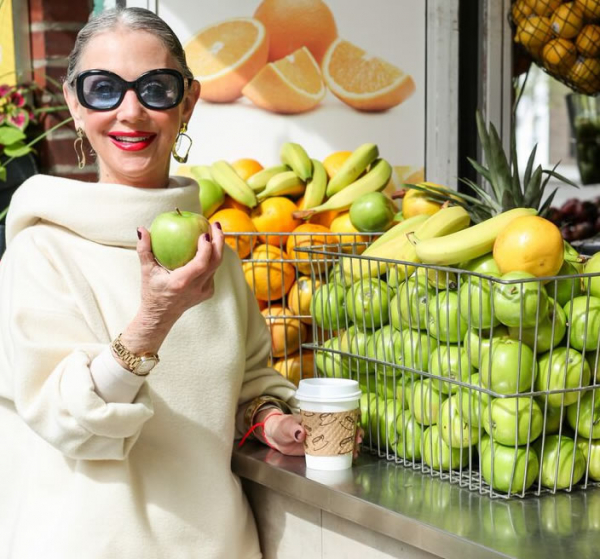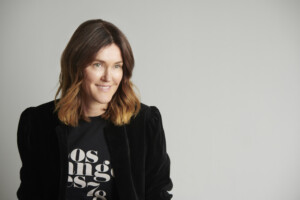Today’s post on the best supplements for optimizing menopause was written by Emma Bardwell —a registered nutritionist, author of The Perimenopause Solution and founder of The M Collective. Emma is an expert in this field and has amazing knowledge to share regarding supplementation for women after 50. Please enjoy!

Registered nutritionist, Emma Bardwell, specializes in women’s health and nutrition.
*Affiliate Disclosure
Take it From an Expert: The Best Supplements for Menopause
In an ideal world, we’d get all the nutrients we need from food.
In reality, life is busy.
I recognize modern living impacts dietary choices, and supplements can be a helpful way to plug nutritional gaps. Stress, work, poor sleep, alcohol, gut health issues, and skipped meals all increase the likelihood we fall short on nutrients that could help optimize our menopause experience.
These are the best supplements for women during the various stages of menopause.
1. Mighty Magnesium for Menopause
Did you know, magnesium is required in over 600 reactions in the body? Reactions such as relaxing muscles and regulating blood sugar levels, to producing energy. Magnesium calms the nervous system and supports the adrenal glands, so plays an important role in how you deal with stress.
Magnesium Deficiency
Even though it’s widely available from food, we often don’t get enough magnesium in our diets, and according to The World Health Organization, up to 75 percent of the population are possibly deficient.
Without enough magnesium we can feel tired, weak, have palpitations, cramps and get those annoying eye twitches. Additional factors, such as alcohol-use, stress, type 2 diabetes and conditions like Crohn’s and celiac disease might mean you’re not getting all the magnesium you need. For women in perimenopause who have anxiety, restless legs, aching muscles, sleep issues, migraines and high blood pressure, magnesium can be very helpful.
How to Supplement With Magnesium
The upper limit for magnesium supplements is 400mg a day but there are lots of different types of magnesium, which all have slightly different effects:
Bisglycinate is good for calming.
Malate helps with muscle relaxation.
Threonate for brain function.
Citrate for constipation.
If you want to try one but aren’t sure which is best, the most easily absorbed all-rounder is magnesium bisglycinate. As well as magnesium capsules and powders, you can buy in a spray form for restless legs and muscle aches, or dissolve two big handfuls of Epsom salts in a warm bath and soak for twenty minutes.
2. Probiotics for Gut Health
A happy gut is the cornerstone of good health. We’re all unique and have different triggers but most people’s gut microbes will benefit from reducing ultra processed foods, stress, and alcohol. We also need to slow down. Most gut related bloating is caused by eating too fast, not from consuming dairy and gluten which often get blamed. Sit down to eat, chew well, take your time.
Benefits of Probiotics
Probiotic supplements can be game changers for people with IBS symptoms. I use the Optibac range in my clinic as they’re a family owned, British company who have undertaken independent clinical trials on their products. The range includes a probiotic for women who suffer from recurrent UTIs and thrush and they have a strain called saccharomyces boulardii which is proven to be helpful after a course of antibiotics.
Colpermin is also good for bloating. It’s a peppermint oil capsule which you take around 30 minutes before a meal, although if you continue to have bloating it’s important to try to pinpoint the cause. I also find digestive enzymes helpful occasionally. I particularly like Pure Encapsulations Digestive Enzymes Ultra.
3. Brain Health and Omega 3s: a Best Supplement for Menopause
Omega 3 is an essential fatty acid that supports brain health and helps brain cells communicate with each other. It has been linked with reduced depression risk and also has anti-inflammatory benefits. Research suggests women over 50 who eat a diet rich in these essential fats have brains that age more slowly.
If women eat two portions of oily fish such as mackerel, salmon, or sardines a week, then omega 3 supplements aren’t necessary, but in my experience not many people manage this. So a good, high-quality fish or algae oil (for vegans and vegetarians) is advisable. My absolute favorite for this is Bare Biology’s Life & Soul range as it has the highest DHA and EPA content on the market.
For the non fish-eaters there’s a vegan algae alternative from the same brand called Vim & Vigour. When buying an omega 3 supplement, look out for the IFOS (International Fish Oil Standards) logo, which guarantees purity.
4. Vitamin D: An Essential Supplement
Vitamin D is the one supplement that we should all be taking.
It’s implicated in immunity, bone and muscle strength, skin integrity, insulin regulation, and brain and nervous system function.
We used to be told to supplement vitamin D only in the winter months here in the UK, but more and more health professionals are advising taking it all year round as population levels of this bone essential hormone (yes, it’s actually a hormone, not a vitamin) are so low. If in doubt, get your levels checked with your GP (optimal levels are 70-80 nmol/L).
It’s incredibly difficult to get vitamin D through food alone, so fortified products and/or supplementing is advised. I recommend a vitamin D3 and K2 combo as D3 is the active form and vitamin K helps with calcium absorption.

Getting vitamins through healthy food is ideal!
5. B Vitamins for Energy
All eight B vitamins play a unique role in the body, but collectively they work to support energy levels and mental health. Deficiencies in any one of them can lead to serious problems: low B12 can mimic the symptoms of dementia, sub optimal B6 can impact progesterone production and if you don’t have sufficient B9 you may experience palpitations and increase your risk of heart disease.
The consensus is unanimous: don’t under-estimate the importance of B vitamins during menopause. They’re water soluble meaning they’re not stored in the body which means they need to be consumed regularly. You can find them in many foods including: liver, seafood, chicken, eggs, lentils, leafy greens, fortified foods (like plant milks and nutritional yeast) and seeds.
B vitamins are lost from foods when we cook them – this is particularly true of over-boiled vegetables (steaming is always best). Alcohol, stress, gut issues, anemia, certain prescription drugs and a vegan diet can also mean you’re not getting the recommended amount. If you’re worried about your B9 or B12 status, you can get your levels tested with your GP.
Implementing B Vitamins
Taking a B complex ensures you’re getting all eight B vitamins and is pretty safe as supplements go; any excess is simply excreted through your urine (excess B2 makes your wee neon yellow, don’t be alarmed). My advice, look for a methylated version; (it’ll say so on the label) to ensure you’re getting the active forms.
Lastly, it’s important to note B12 is only found in animal products. The Vegan Society recommends non-meat eaters take a 10mcg B12 supplement daily or 2000mcg weekly. Women over the age of 50 and anyone taking the prescription drug, Metformin, are also recommended to supplement as B12 absorption is impacted in both scenarios.
6. Creatine for Muscle and Strength
Creatine monohydrate is a supplement that has been researched extensively and has a good safety record but doesn’t get as much airtime as it deserves. It is very beneficial, especially for women who work out a lot. It helps performance (increased strength and power) and muscle building and more was recently linked with improved cognition, although more research is needed. It’s cheap and you only need 3-5g daily to get benefits. I take it daily and really notice the days when I forget. I always list this as a best supplement to use during menopause.
Expert Tip: Think About the Delivery System
Some people find it hard to absorb vitamins and minerals, especially if they have IBS and other gut health issues. There are lots of alternatives to pills and capsules. For example women who can’t seem to get their iron levels up might get better results using a skin patch like PatchMD. Sublingual vitamins (taken under the tongue) can also be better absorbed for some people.
For others, it’s simply a case of what suits their lifestyle — sprays can be thrown into a handbag and are easy to administer, especially for kids or people who struggle to swallow pills. Fat soluble vitamins like vitamin D should ideally be taken with a meal containing some fat. This isn’t always convenient so some companies like NutriAdvanced put them in liquid form mixed with a little tasteless oil.
A Note on Herbal Remedies
For herbal remedies, make sure it has the THR stamp (Traditional Herbal Registration) to assure quality and safety.
Herbs such as black cohosh and St John’s Wort are regularly marketed at menopausal women. They might come under the ‘natural’ umbrella, but they can be extremely potent and may interact with prescription drugs.
A Last Thought on Menopause Supplements
Menopause is a multi-billion pound industry now, brands are seeing an opportunity to cash in and are selling women pretty standard supplements that have simply been rebranded with the word ‘meno’. This is known as meno washing. If you’re unsure about what you’re currently taking or want to start a new regime, my advice is always to work with a qualified healthcare provider.
These are some of the best supplements for menopause. What are your favorite supplements to take?

Emma Bardwell’s evidence based, no nonsense approach has made her one of the go-to names in women’s health and nutrition. She combines the most up-to-date research with scientifically backed lifestyle strategies to help women optimize their menopause transition. Emma is deeply anti-fad and doesn’t care for restriction, believing in positive rather than perfect nutrition.
Follow Emma on Instagram to learn more about the best supplements for menopause and expert nutrition insight!
If you enjoyed this story please subscribe to my email list. When I post a new story, you will be the first to receive it in your inbox.
*Honey Good may receive a small commission for items purchased through links on this page. This helps with the cost of running the site and is at no additional cost to you.
+ show Comments
- Hide Comments
add a comment